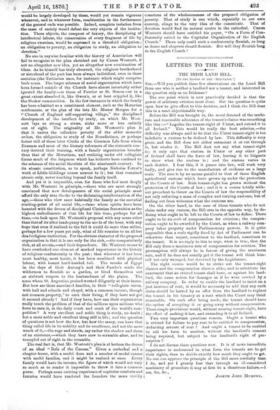(To THE EDITOR OF THE "SPRCTITOR.1 SIR,—Will you publish these
few observations on the Laud Bill from one who is neither a landlord nor a tenant, and interested in the question only as an Irishman?
The one point which is now practically decided is that the power of arbitrary eviction must close. But the question is quite open how to give effect to this decision, and I think the Bill does this in a most objectionable way.
Before the Bill was brought in, the usual demand of the mode- rate and reasonable advocates of the tenant's claims was something like this :—" Legalize the tenant-right of Ulster, and extend it to all Ireland." This would be really the best solution,—the difficulty was always said to be that the Ulster tenant-right is too indefinite a custom to be defined by law. This difficulty is very great, and the Bill does not either surmount it or cut through it, but evades it. The Bill does not say what tenant-right is ; it only says that custom in Ulster or any other part of Ireland shall have the force of law, leaving it to litigants to show what the custom is ; and the custom varies in each district. I fear this, if it passes into law, will work very badly, and give rise to the manufacture of evidence on a large scale. The case is by no means parallel to that of those English agricultural customs which have grown up under the protection of the Courts of law. Irish tenant-right has grown without the protection of the Courts of law ; and it is a course totally with- out precedent to throw on the Courts of law the responsibility of not only enforcing a mass of complex and varying customs, but of finding out from witnesses what the customs are.
On the other hand, in the case of those tenants who do not claim under any custom, the Bill errs in the opposite way, by de- fining what ought to be left to the Courts of law to define. There ought to be no scale of compensation for eviction ; the compen- sation ought to be awarded by the Court, as when a railway com- pany takes property under Parliamentary powers. It is quite impossible that a scale rigidly fixed by Act of Parliament can be otherwise than unjust, sometimes to the landlord, sometimes to the tenant. It is no reply to this to urge, what is true, that the Bill only fixes a maximum rate of compensation for eviction. The presumption will always be in favour of giving the maximum rate, and if he does not usually get it the tenant will think him- self not only wronged, but deceived by the Legislature.
The right course would be to strike out the tenant-right clauses and the compensation clauses alike, and to substitute the enactment that an evicted tenant shall have, as against his land- lord, the same action for damages as if he were evicted by a railway company. In order to enable the landlord to insist on a just increase of rent, it would be necessary to add that any such claim should be barred by an offer from the landlord to replace the tenant in his tenancy at a rent which the Court may think reasonable. On such offer being made, the tenant should have the option of accepting it or going away without compensation. These simple provisions would, without naming tenant-right, have the effect of making it law, and extending it to all Ireland.
Two very important questions remain. Ought a tenant who is evicted for failure to pay rent to be entitled to compensation, deducting arrears of rent ? And ought a tenant to be enabled to sell his farm to another, without the landlord's consent being required, but subject to the landlord's right of pre- emption ?
I do not discuss these questions now. It is of more immediate importance to understand in what form the tenants are to get their rights, than to decide exactly bow much they ought to get. No one can approve the principle of the Bill more cordially than I do, and yet I greatly fear that through an ill-considered machinery of procedure it may at first be a disastrous failure.—I am, Sir, &c.,
Josxra JOILN MURPHY.






























 Previous page
Previous page